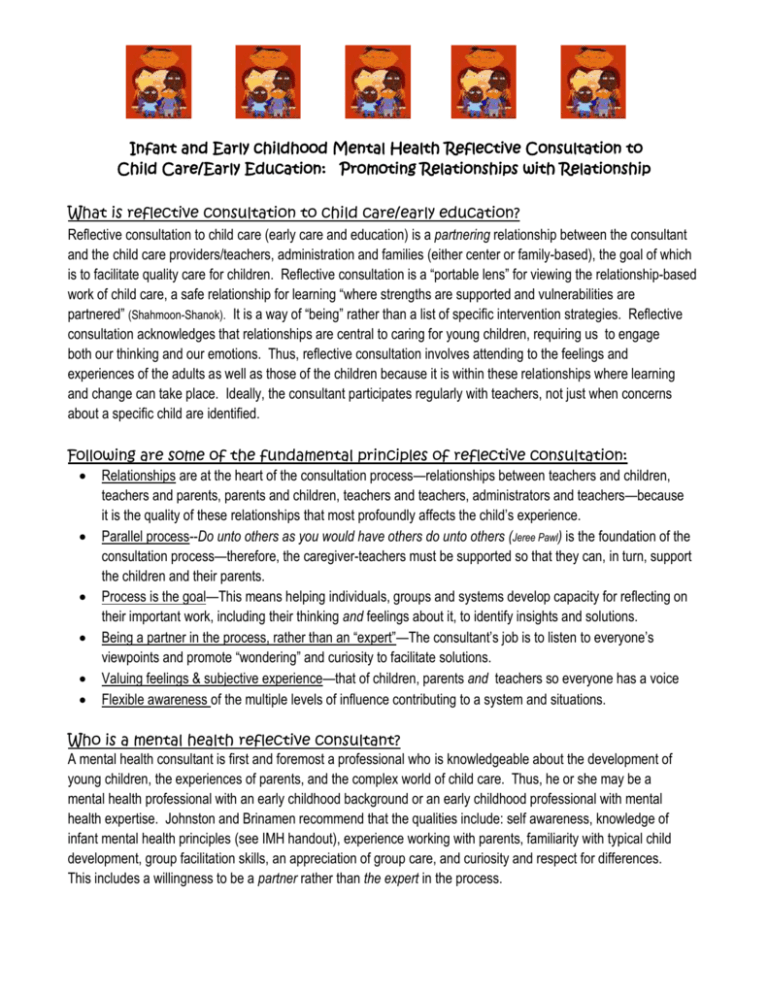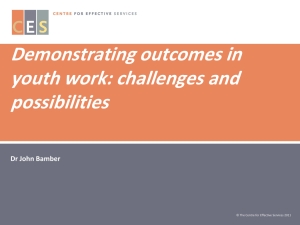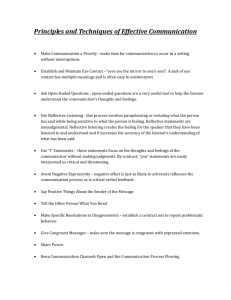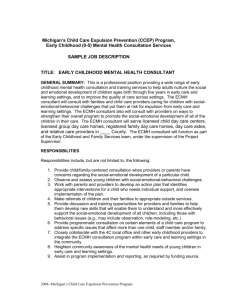Infant and Early childhood Mental Health Consultation
advertisement

Infant and Early childhood Mental Health Reflective Consultation to Child Care/Early Education: Promoting Relationships with Relationship What is reflective consultation to child care/early education? Reflective consultation to child care (early care and education) is a partnering relationship between the consultant and the child care providers/teachers, administration and families (either center or family-based), the goal of which is to facilitate quality care for children. Reflective consultation is a “portable lens” for viewing the relationship-based work of child care, a safe relationship for learning “where strengths are supported and vulnerabilities are partnered” (Shahmoon-Shanok). It is a way of “being” rather than a list of specific intervention strategies. Reflective consultation acknowledges that relationships are central to caring for young children, requiring us to engage both our thinking and our emotions. Thus, reflective consultation involves attending to the feelings and experiences of the adults as well as those of the children because it is within these relationships where learning and change can take place. Ideally, the consultant participates regularly with teachers, not just when concerns about a specific child are identified. Following are some of the fundamental principles of reflective consultation: Relationships are at the heart of the consultation process—relationships between teachers and children, teachers and parents, parents and children, teachers and teachers, administrators and teachers—because it is the quality of these relationships that most profoundly affects the child’s experience. Parallel process--Do unto others as you would have others do unto others (Jeree Pawl) is the foundation of the consultation process—therefore, the caregiver-teachers must be supported so that they can, in turn, support the children and their parents. Process is the goal—This means helping individuals, groups and systems develop capacity for reflecting on their important work, including their thinking and feelings about it, to identify insights and solutions. Being a partner in the process, rather than an “expert”—The consultant’s job is to listen to everyone’s viewpoints and promote “wondering” and curiosity to facilitate solutions. Valuing feelings & subjective experience—that of children, parents and teachers so everyone has a voice Flexible awareness of the multiple levels of influence contributing to a system and situations. Who is a mental health reflective consultant? A mental health consultant is first and foremost a professional who is knowledgeable about the development of young children, the experiences of parents, and the complex world of child care. Thus, he or she may be a mental health professional with an early childhood background or an early childhood professional with mental health expertise. Johnston and Brinamen recommend that the qualities include: self awareness, knowledge of infant mental health principles (see IMH handout), experience working with parents, familiarity with typical child development, group facilitation skills, an appreciation of group care, and curiosity and respect for differences. This includes a willingness to be a partner rather than the expert in the process. Why offer reflective consultation to child care? Because nearly 70% of Minnesota children under six spend part of their day in non-parental care and these children and their families deserve quality services. Because children’s early experiences (especially with relationships) have a critical impact on the developing architecture of the brain—early experiences actually organize the brain and provide the foundation for all future learning and relationships. Because children’s early relationships provide the context for how children learn social-emotional skills (mental health), including the ability to regulate emotion, behavior and attention, skills necessary for school success and healthy relationships. Because caring for young children and supporting their families is challenging work and requires that child care teachers have the opportunity to replenish the reserves needed to interact with families in a responsive, supportive, and planful manner. Because mental health consultation to child care provides a safe place for the teacher to consider her assumptions about relationships, look at how she expresses empathy, and be open to considering new ideas about how to go forward with a child and family. Because as a result of being heard by the consultant, the teacher can better listen to families and be curious about and discover the things that are important and meaningful to them about their child and themselves. Because a well-supported caregiver benefits parents as they, then, experience a supportive relationship with an accepting, engaged and caring professional, and; Because this supportive relationship between parents and teachers benefits young children by supporting the capacities of their parents to provide nurturing care. Michele Fallon, MSW, IMH-E™ Infant and Early Childhood Mental Health Consultant Whataboutthebaby@comcast.net Johnston & Brinamen (2006), Mental Health Consultation in Child Care: Transforming Relationships Among Directors, Teachers and Families, Washington D.C.: ZERO TO THREE Press Eggbeer, Mann & Siebel (2007). Reflective supervision: Past, present and future. ZERO TO THREE, 28 (2). (P. 5-9)






